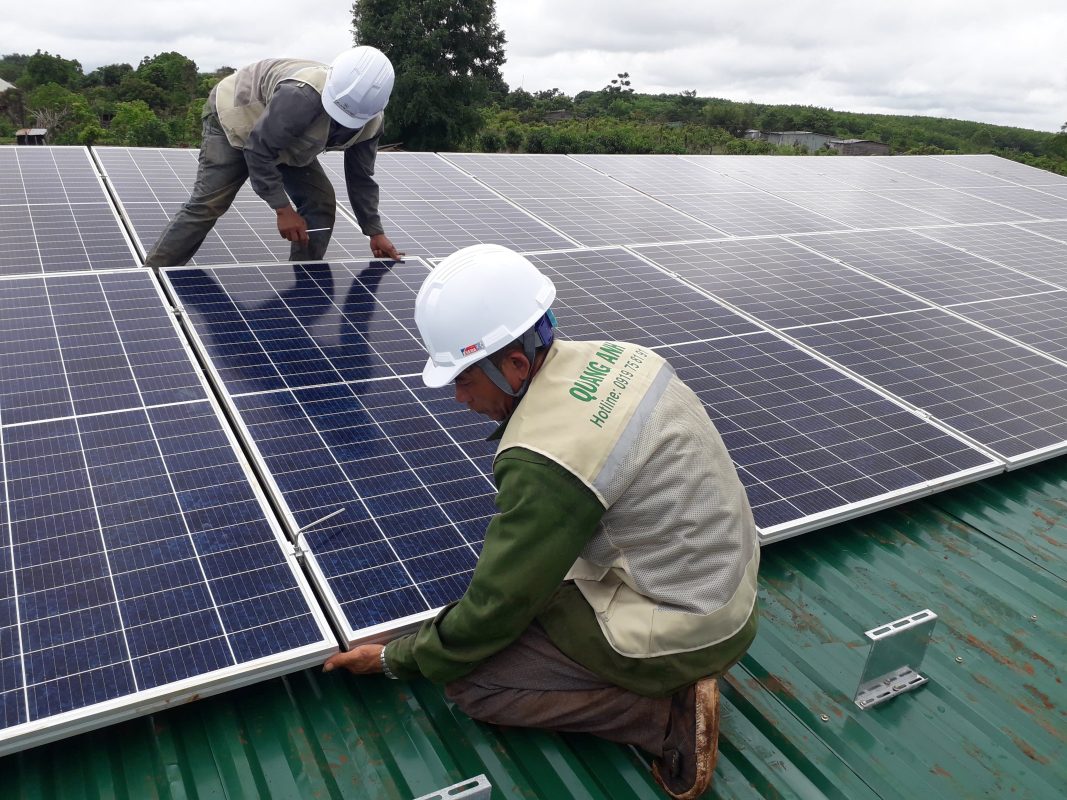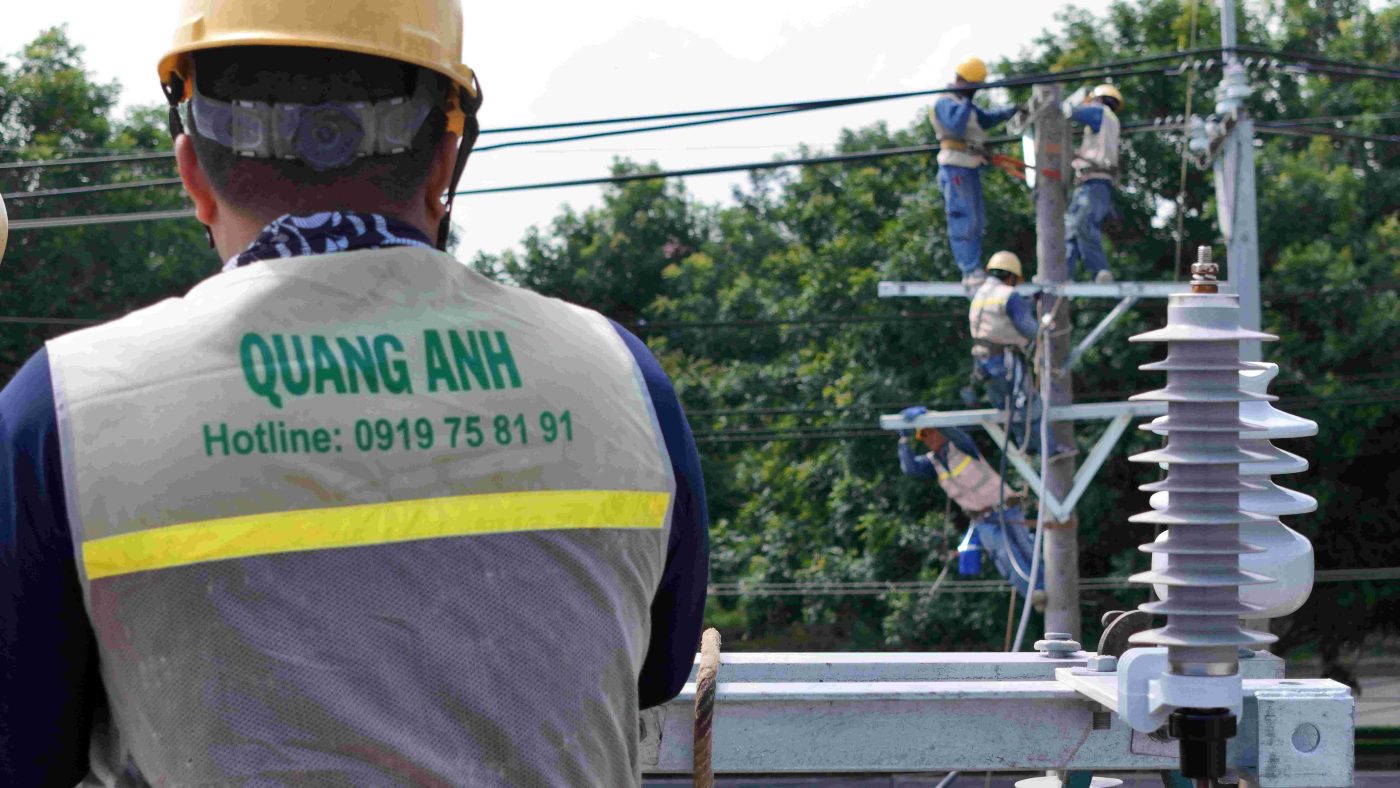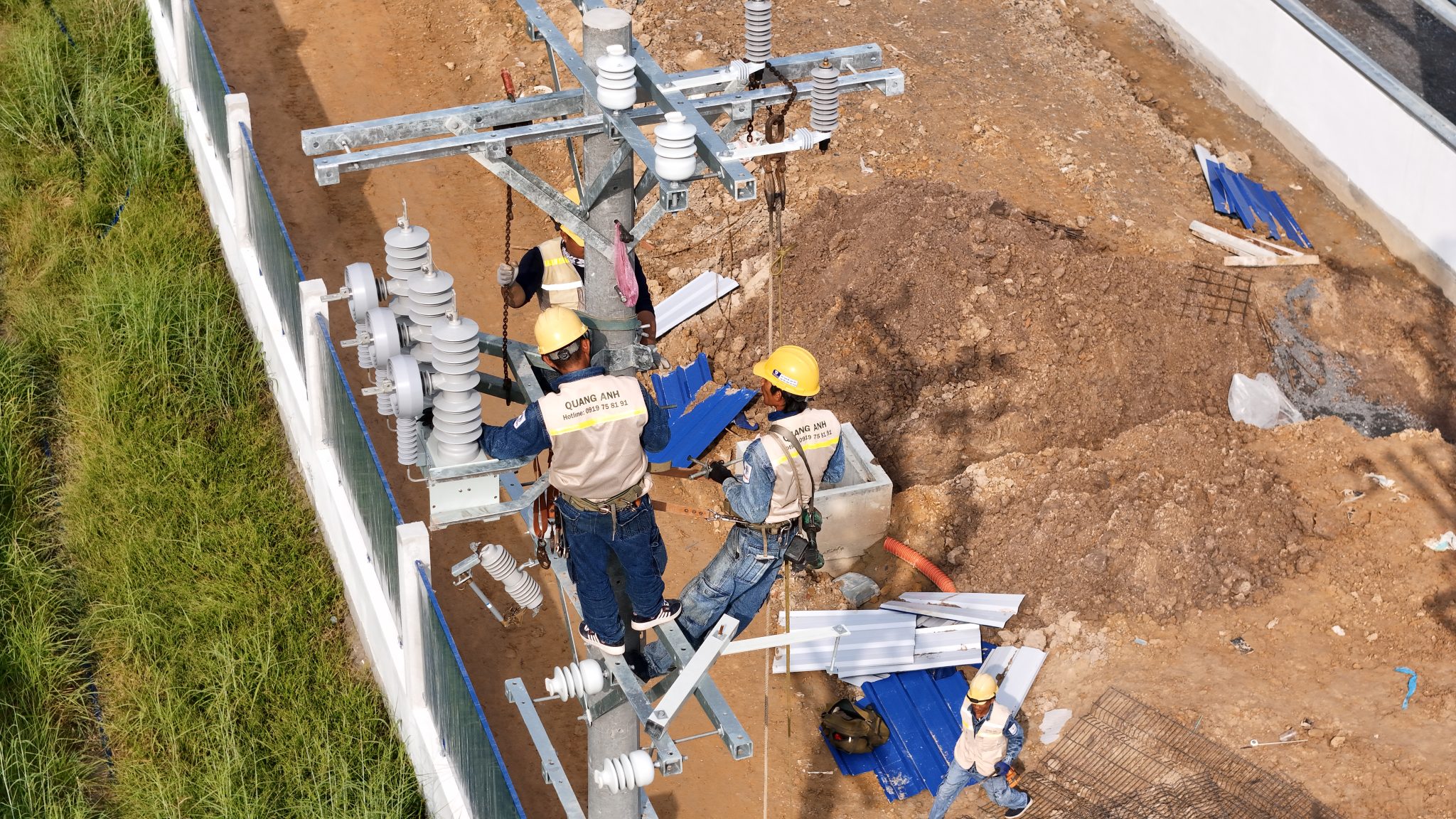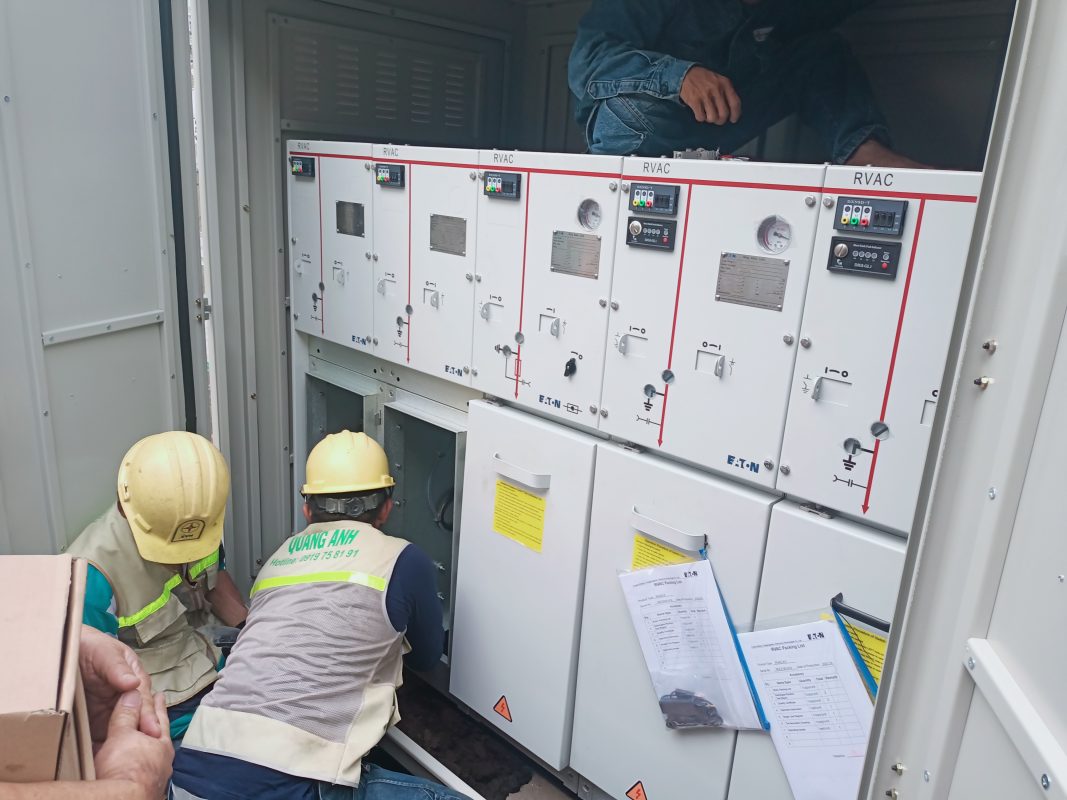Table of Contents:
Investing in a 1MWp solar power system in Vietnam ranges from 8.5 to 15 million VND per kWp, influenced by equipment quality, product brand, and system scale.
Economic Benefits of Solar Power
The investment for a 1MWp solar power system varies from 8.5 to 15 million VND per kWp, with differences attributed to equipment quality, brand, and system size. Medium-quality equipment might cost up to 15 million VND per kWp, while larger systems over 1 MWp can lower costs to about 8.5 million VND per kWp due to economies of scale. The return on investment is typically 4-5 years, aided by reduced costs and attractive selling prices in Vietnam, especially with electricity prices reaching 3,000-4,300 VND per kWh during peak hours.
Solar power plays a vital role in providing clean, sustainable energy in Vietnam, offering substantial economic benefits. First, the system reduces energy costs for households and businesses. In recent years, the production and installation costs of solar energy systems have decreased significantly, facilitating cost savings and promoting sustainable development.
Another noteworthy advantage is job creation and boosting local economies. Installing, operating, and maintaining solar energy equipment, such as from reputable brands like ABB and Schneider, can generate numerous job opportunities, supporting community economic growth and national energy security.
Businesses also benefit from increased productivity and reduced production costs with solar power. By notably reducing operating costs, particularly during peak hours, companies can optimize profits and achieve a fast return on investment, typically a few to over ten years, depending on the industry.
Solar energy systems also alleviate stress on the national grid. Distributed electricity generation from solar sources greatly reduces the risk of grid overload, ensuring higher stability and safety for the national electricity system.
Importantly, using solar energy fosters sustainable economic development and reduces CO2 emissions. As a renewable energy source, solar power not only decreases reliance on fossil fuels but also limits greenhouse gas emissions, improving environmental quality. Additionally, solar systems enhance asset value and build a green brand for businesses, reflecting a commitment to the environment and winning trust from customers and partners.

Factors Affecting Investment Cost
The main factors affecting the investment cost for a solar power system include the quality and brand of solar panels (accounting for about 60% of the total investment cost), roof structure, land area used, and geographical location. Different regions influence the electricity output, with 1 kWp generating 4-5 kWh/day, equivalent to 120-150 kWh/month. A 1 MWp system can produce around 180,000 kWh/month depending on the installation area.
Determining the investment cost for a solar power system is influenced by diverse factors, including economic, social, financial, and legal aspects. A prominent factor is the interest rate on loans, which directly impacts investment decisions. When interest rates rise, borrowing becomes more challenging, increasing loan costs, and significantly affecting investor decisions.
Additionally, the business environment and legal policies play crucial roles. A favorable business environment with quick administrative procedures minimizes time and unofficial costs, enhancing investment appeal. Local legal regulations can be a hurdle or a catalyst for investment activities, depending on their alignment with proposed investment costs.
The Provincial Competitiveness Index (PCI) is also vital, with factors like market entry costs, land access, administrative procedures, information accessibility, support services, and labor training. These elements contribute to the safety and efficiency of investments in specific areas.
For enterprises, intrinsic factors like expected profit margins, fixed assets, debt levels, and ownership types significantly impact capital mobilization and investment decisions. Social factors cannot be overlooked, as community influence, peers, and investment advisory organizations can sway final investment decisions.
Finally, inflation rates and financial market conditions are essential considerations in any investment decision, as they directly affect interest rates and investment costs.
These factors collectively shape investment decisions for each solar power project.

Government Support Policies
The Vietnamese government encourages the development of rooftop solar power systems with Decision No. 11/2017/QD-TTg and regulations from the Ministry of Industry and Trade, like Circular 16/2017/TT-BCT. Decree 135/2024/ND-CP has also been issued to promote solar power development, making it easier for enterprises and individuals to access this renewable energy source.
In the coming years, Vietnam’s energy policy focuses on developing supportive industries, technological transfer, and digital transformation to promote sustainable development and optimize Vietnam’s electricity market. New decrees will bring significant changes and notable support for the economy:
- Development of supporting industries: Decree 205/2025/ND-CP, effective from 01/9/2025, encourages organizations and individuals to engage in research applications, technological innovation, and improvement. This will benefit from funds like the National Innovation Technology Fund and the National Science and Technology Development Fund, contributing to the development of supporting industries and Vietnam’s electricity market.
- Reviving agricultural production: Decree 9/2025/ND-CP will be effective from early 2025 to support agricultural production affected by natural disasters. The government will provide financial assistance for crops, livestock, and aquaculture, with specific support levels for aquaculture reaching up to 60 million VND/ha.
- Digital transformation and cybersecurity: Decree 179/2025/ND-CP, effective from 15/8/2025, provides a subsidy of 5 million VND/month for participants in digital transformation and information security. This promotes cybersecurity management development and fosters sustainable technological development.
- Public investment disbursement acceleration: In 2025, the government plans to expedite public investment disbursement with a target rate of at least 95% of the planned amount, aiming to stimulate economic growth and complete critical infrastructure projects like highways and airports.

Investing in a 1MWp solar power system offers numerous economic and technical benefits. With an investment range of 8.5 to 15 million VND per kWp and a quick return period of 4-5 years, it is a viable option for large enterprises looking to optimize costs and achieve sustainable growth.
Contact QuangAnhcons at hotline +84 9 1975 8191 for detailed consultancy on the investment and installation of a 1MWp solar power system.
QuangAnhcons offers high-quality consultancy and installation services for solar power systems, optimizing costs for businesses and adhering to government sustainable development policies.
[contact-form-7 id="7239967" title="Contact form 1"]


Related Posts
Tay Ninh Solar Power Planning: Technical Framework, Grid Interconnection, and Rollout Roadmap
Technical overview of solar planning in Tay Ninh: irradiation, grid capacity, permitting, design, operations, and [...]
Dec
Binh Duong Solar Planning: Regulatory Framework, Grid Interconnection, and an Implementation Roadmap for Factories and Industrial Parks
An overview of Binh Duong solar planning: legal framework, interconnection, design, risk management, and an [...]
Dec
Solar Farm Repair: O&M Workflow, IV Curve Diagnostics, Thermography, Inverter Service and Utility-Scale Safety
A utility-scale solar farm repair plan centered on O&M, IV curves, thermal imaging, inverter service, [...]
Dec
Dong Nai Solar Power Plan 2023–2025: Tri An 1,029 MW, Grid Upgrades and the DPPA Pathway
A complete look at Dong Nai’s solar power plan: Tri An 1,029 MW, irradiation potential, [...]
Nov
Quang Ngai Solar Power Plan 2024–2030: Legal Framework, Irradiance Potential, and Development Roadmap
A complete look at Quang Ngai’s solar power plan: capacity targets, irradiance (PVout), development zones, [...]
Nov
Solar Damage Assessment Services: On-Site Procedures, EL/IV/Thermography Testing & Compliance with Standards
Discover IEC/UL/NEC standard solar damage assessment processes: on-site evaluation, EL and IV curve testing, thermal [...]
Nov
Comprehensive Package Estimate for a 1800MVA 500kV Substation: Scope, Configuration 3x600MVA, Standards and Timeline Management
An overview of the 1800MVA 500kV substation estimate: construction scope, configuration 3x600MVA, GIS/AIS, SCADA, standards, [...]
Nov
Factory Electrical Systems: Comprehensive Design and Implementation Guide
Discover the detailed and safe process of factory electrical systems design and implementation. [...]
Oct
Blueprints Required for Factory Construction Permits
Discover the necessary blueprints in factory construction permit applications, from floor plans to electrical and [...]
Oct
What Are the Requirements for a Factory Construction Permit? A Comprehensive Guide
Explore the documentation and steps needed to secure a factory construction permit for streamlined project [...]
Oct
Factory Construction Permit Procedures in Vietnam: Essential Guidelines and Documents
Learn the procedures for securing a factory construction permit in Vietnam, focusing on document preparation [...]
Oct
Key Steps in the Factory Construction Process
Discover the essential steps and requirements for building factories. [...]
Oct
Comprehensive Electrical Substation Solutions by Quanganhcons
Discover the cutting-edge electrical substation solutions offered by Quanganhcons for industrial applications. [...]
Oct
Investment Costs for a 1MWp Solar Power System and Influencing Factors
Explore the investment costs for a 1MWp solar power system in Vietnam and the influencing [...]
Sep
QuangAnhcons: Elevating Wind Energy Solutions
Explore QuangAnhcons' leadership in wind energy and renewable solutions in Vietnam. [...]
Sep
Electrical Contractor Strategies at Becamex Industrial Park
Discover the strategic advancements and partnerships of the electrical contractor at Becamex Industrial Park. [...]
Sep
Investment Insights for 1MW Wind Energy in Vietnam: Costs and Opportunities
Discover the detailed analysis of costs and opportunities for investing in 1MW wind energy projects [...]
Sep
Advanced Electrical Installation Solutions by QuangAnhcons
Explore advanced electrical installation solutions and modern technology with QuangAnhcons. [...]
Sep
Enhancing Industrial Electrical Services with Quanganhcons
Discover Quanganhcons' expertise in industrial electrical services, offering efficient and sustainable power systems. [...]
Sep
Comprehensive MEP Solutions by QuangAnhcons: From Design to Maintenance Excellence
Discover optimal MEP solutions with QuangAnhcons, dedicated to excellence from design through maintenance. [...]
Sep